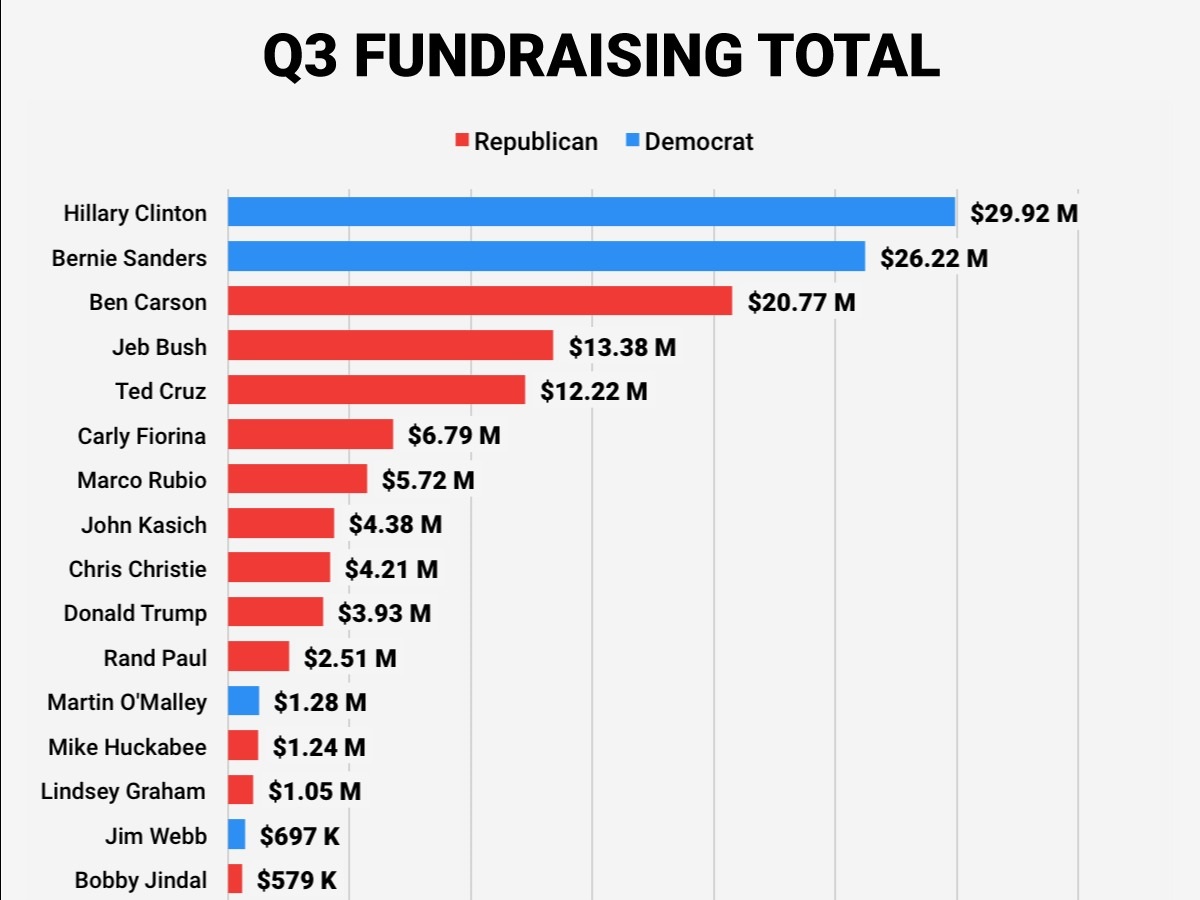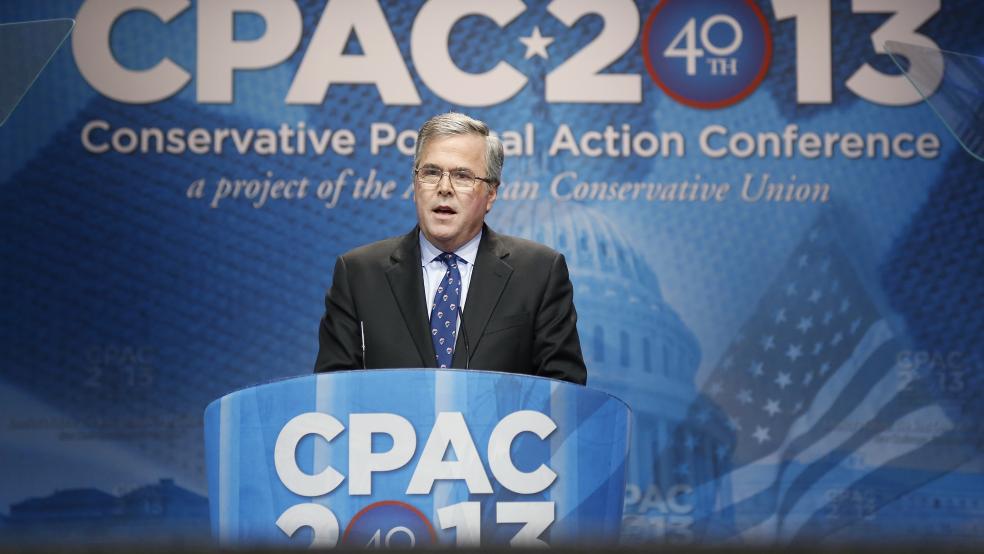Former Florida governor Jeb Bush’s political stock has fallen sharply over the past few months. The debate now taking place among Republicans is whether that stock is undervalued or a fair reading of the current shape of his campaign.
The latest quarterly financial reports brought new questions for the candidate who began the campaign with assets none of his rivals could match. He raised barely more in the third quarter than he did in the second — even though his second-quarter fundraising amounted to just 16 days of activity. His average daily fundraising dropped sharply from one quarter to the next.
Bush advisers cry foul at some of the interpretation of his fundraising prowess. Yes, as the son and brother of former presidents, he is supposed to have a big network of potential givers. But, they argue, look at what Mitt Romney raised in the third quarter of 2011 when he, as the GOP front-runner, had the biggest fundraising network of any of the candidates. Romney raised less than a million dollars more than Bush did this time.
That’s one way to look at it, but pull back a bit and you can see the potential trap Bush’s team has set for itself. By this time four years ago, Romney had raised just over $34 million. That compares with Bush’s total of about $25 million to date. Romney then had almost $15 million in cash available. Bush has about $10 million.
Third-quarter fundraising is notoriously difficult for all candidates. The next quarter will provide another opportunity for comparison between Bush 2016 and Romney 2012. In the fourth quarter of 2011, Romney’s network produced another $24 million and ended the year with almost $20 million in cash available. Bush will have to step up his pace significantly if his team hopes to keep making comparisons to Romney.

Source-Business Insider
Bush advisers say it’s tough to raise huge amounts of money in a field with so many candidates. That’s indisputable. Still, he has drawn critical coverage for fundraising numbers that either lag or are about equal with others in the Republican field who started with far fewer assets. So far this year, he’s raised less than Ben Carson, slightly less than Sen. Ted Cruz (Tex.) and slightly more than Sen. Marco Rubio (Fla.). His third quarter fundraising was second best behind Carson.
The Bush and Rubio campaigns were squabbling late in the week over the exact amounts of cash in the bank and available for the nomination campaign as opposed to the general election. Their quibbles were over relatively insignificant amounts of money.
The bottom line is that Bush’s campaign account is competitive with that of Cruz, Carson and Rubio, and it is well ahead of two other mainstream conservative candidates, Ohio Gov. John Kasich and New Jersey Gov. Chris Christie. Donald Trump, the self-funder, is in a different category.
The third-quarter-fundraising reports tell one part of the story of the Republican campaign over the summer. Polling tells another. Overall, the biggest surprise — well-documented and often-cited — has been the staying power of Donald Trump as the GOP leader. In July, he led the Pollster.com average of national polls, its average of Iowa polls and its average of New Hampshire polls.
That’s still true today, although in each case his support has grown. In July, Trump’s national poll average was just under 15 percent, according to Pollster.com. His current average nationally is just over 28 percent. In Iowa, he’s risen from 14 percent in June to almost 24 percent today. In New Hampshire, he’s is up from about 20 percent to about 28 percent.
[The Bush-Rubio competition heats up in Florida]
What’s happened to Bush during the past three months? Nationally, Bush was running second in July with an average poll rating of 13 to 14 percent. Today he’s fallen to just about 8 percent and is fourth overall. In Iowa, his average has dropped a couple of points (within the margin of error) and his standing is now fifth rather than third. In New Hampshire, he’s gone from second place in the poll average to fifth and his support has fallen several points.
With Kasich and Christie farther down, Bush and Rubio are seen on a collision course in the mainstream conservative competition. Rubio has gotten the better of the coverage of late, the aspirational fresh face versus a candidate with experience and a family name that is a mixed blessing. Rubio’s debate performances have been well praised, and his approach to campaigning similarly has been commended for its patience and potential.
There are caveats, however. Rubio raised less than half of what Bush collected in the third quarter. In fact, he raised a million and a half dollars less than Wisconsin Gov. Scott Walker, who quit the race last month. He raised about as million less than Carly Fiorina.
The same holds for what the polls show. Between July and today, Rubio’s poll numbers nationally have ticked up a point and he continues to occupy third place. In Iowa, he’s lost a point and has dropped from fifth to sixth. In New Hampshire, he’s also lost a point and dropped one place, to seventh. This is not evidence of a surge. If Bush has performed below expectations as a candidate, Rubio has not yet played up to the potential for attracting support that some Republicans see in him.
[Bush-Rubio trade barbs over fundraising]
Bush’s financial advantages now rest almost exclusively with his super PAC. The committee raised $103 million through the second quarter. (Third quarter results are not yet available.) That amount dwarfs what all the other Republicans have available, save for Trump’s personal fortune.
The committee has already spent $13 million on television ads in Iowa, New Hampshire and South Carolina. The group has reserved a total of $23 million in television time through the end of the year plus another $17 million for those states in January and February. The committee announced recently that it had reserved $17 million in ad time for states with contests on March 1.
There’s little evidence that the money spent over the past month has begun to boost Bush’s stock, although his advisers say there are signs of improvement in his personal image, which they hope is a precursor to improvement in his overall standing. Advisers to the Bush super PAC said they had not set times or targets by which to measure whether the hefty spending on advertising was paying dividends.
“We have a benchmark for success and it’s to win more delegates,” super PAC leader Mike Murphy said in an e-mail message relayed through one of his colleagues.
One Bush adviser said the campaign has hit its financial targets for the quarter and is focused on the “blocking and tackling” of building a broad and sustainable campaign operation capable of going the distance.
Money for television ads and investment in organizations in the states are certainly important, but mechanics can carry a campaign only so far. What a winning campaign needs is a candidate who can begin to inspire Republican voters. That remains the biggest challenge for Bush and there’s little his advisers can do about that.
This article was published originally in The Washington Post.
Read more at The Washington Post:





